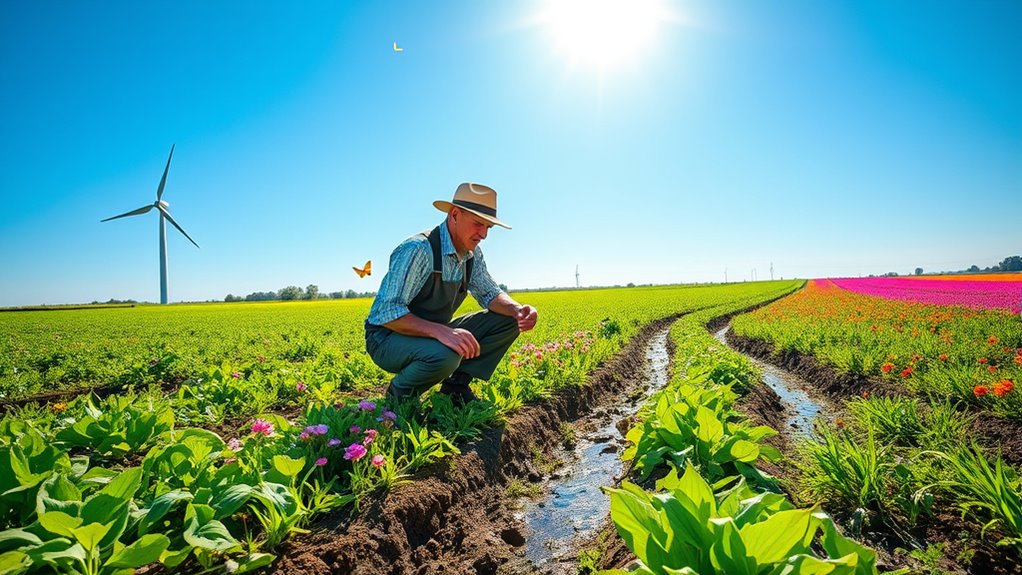Sustainability is often misunderstood. Many think it only costs money, but it actually boosts profitability by cutting waste and energy costs. You might believe that recycling solves all problems, but it has limitations and contamination can spoil efforts. Plus, consumers want eco-friendly options, driving demand for sustainable products. Finally, claiming all local food is sustainable overlooks various farming practices. There’s more to uncover about the myths and facts surrounding sustainability that could reshape your understanding.
Key Takeaways
- Sustainability enhances long-term profitability and can lead to significant cost savings in energy and waste management.
- Not all plastics are recyclable, and contamination can ruin entire batches, limiting effective recycling.
- Over 66% of consumers actively seek eco-friendly brands, indicating a strong market preference for sustainable products.
- Misconceptions about renewable energy hinder its adoption, despite its potential for efficiency and reliability improvements.
- Individual actions can significantly contribute to combating climate change, debunking the myth that only large-scale changes matter.
Economic Myths Surrounding Sustainability

While many companies fear that embracing sustainability will hurt their bottom line, the reality is quite the opposite.
In fact, adopting sustainable practices can unlock new value and enhance long-term profitability. You’ll find that reducing energy consumption and waste management costs often leads to significant savings. Additionally, 98% of CEOs believe it’s their role to make businesses more sustainable, reflecting a growing recognition of sustainability as a value creation aspect. Moreover, businesses can leverage data-driven marketing strategies to enhance their sustainability messaging and attract eco-conscious consumers. Furthermore, integrating energy-efficient systems like heat pumps can lead to substantial operational cost reductions over time. For example, using solar energy solutions can significantly decrease electricity expenses, contributing to overall cost savings.
Plus, today’s consumers actively seek eco-friendly products, meaning businesses that ignore this demand risk losing market share.
Today’s consumers prioritize eco-friendly products, making it essential for businesses to meet this demand or risk losing market share.
Stricter regulations can also spell disaster for non-compliant companies, leading to fines and disruptions.
Investors are increasingly scrutinizing ESG factors, making it tougher for companies with poor sustainability records to attract capital.
Embracing sustainability isn’t just a responsible choice; it’s a smart economic strategy for future success.
Understanding Recycling and Its Limitations

Embracing sustainability goes beyond economic benefits; it also involves understanding how recycling fits into the broader environmental landscape.
Recycling starts with collecting materials, followed by sorting at a Materials Recovery Facility. These sorted materials undergo processing to become new products, creating demand for recycled goods. However, not all plastics are recyclable, and contamination can spoil entire batches. Plastic pollution costs industries approximately $2.5 trillion annually, highlighting the urgent need for effective recycling practices. Economic viability and technological constraints also limit recycling for certain materials. Additionally, understanding the importance of omega-3 content in plant-based diets can promote a more sustainable food system. Prophetic dreams can serve as a reminder of the interconnectedness of our actions and their impact on the environment. Furthermore, the harmful effects of wood-burning emissions on air quality underscore the importance of exploring comprehensive sustainability solutions.
Different regions have varying recycling capabilities, which can complicate the process. While recycling conserves resources and reduces landfill waste, it’s important to recognize its limitations.
Understanding these aspects helps you make more informed decisions and contribute effectively to sustainability initiatives.
The Importance of Global Involvement in Sustainability

As the world faces escalating environmental challenges, your involvement in global sustainability efforts is crucial. By engaging in these initiatives, you can help stimulate green industries that may create over 40 million jobs by 2050. Sustainable practices not only foster economic resilience but also enhance community well-being, reducing poverty and improving quality of life. You’ll find that sustainable investing is gaining traction, with over $21.4 trillion in global assets already committed. Additionally, by supporting green infrastructure projects, you contribute to job growth in various sectors. Embracing sustainable practices means lowering operational costs for businesses, promoting a healthier economy. Moreover, sustainable programmes offer long-term benefits to communities even after external support ceases. Engaging in biodiversity conservation can further amplify these positive impacts by preserving essential ecosystem services that support local communities. Furthermore, the rise of eco-friendly accommodations worldwide reflects a growing commitment to sustainability in the travel industry. In addition, the adoption of renewable energy technologies is critical for reducing carbon emissions and promoting sustainable development.
Consumer Behavior and Sustainable Products

Understanding consumer behavior is essential for promoting sustainable products, especially since the demand for eco-friendly options is skyrocketing.
Understanding consumer behavior is crucial as the demand for sustainable products continues to rise rapidly.
You’ve likely noticed that 66% of shoppers now seek out eco-friendly brands, reflecting a clear shift in preferences. In fact, 72% of you report buying more sustainable products than five years ago, and those products grow 2.7 times faster than their non-sustainable counterparts.
If you’re willing to pay more for these brands, you’re not alone—55% of consumers feel the same way. However, price sensitivity can still influence your choices. Additionally, 63% of consumers are willing to change purchasing habits to reduce environmental impact, showcasing a strong commitment to sustainability. This shift is often driven by a growing awareness of cost-cutting strategies that can make sustainable choices more accessible. Implementing a personal budget can help consumers allocate funds towards these eco-friendly options. Moreover, many consumers are increasingly recognizing the value of natural remedies as part of their sustainable lifestyle choices.
As you become more aware of greenwashing, trust in brands that genuinely commit to sustainability becomes crucial. Embracing eco-friendly habits not only supports the environment but aligns with your values as a conscious consumer.
Technological Challenges in Renewable Energy

While the push for renewable energy is gaining momentum, several technological challenges can hinder its widespread adoption.
Integrating renewables into existing power grids isn’t straightforward; it requires managing grid stability and security. You’ll find that energy storage systems must be scalable and cost-effective, yet they remain a significant barrier. Additionally, intermittent solar and wind power can create reliability issues, leading to fluctuations in voltage and frequency. Accurate forecasting of energy generation is crucial but challenging, complicating grid management. Geothermal heat pumps, for example, can provide energy savings on heating and cooling costs, which underscores the importance of addressing these challenges. Furthermore, the integration of advanced technology can significantly enhance the efficiency and reliability of energy systems. For instance, innovations in energy storage technologies can optimize the use of renewable energy. Lastly, high initial costs and inconsistent regulatory frameworks can deter investment in renewable technologies. Addressing these challenges is essential for realizing the full potential of renewable energy and achieving a sustainable future.
Addressing Climate Change Myths

The challenges in adopting renewable energy highlight the urgent need to clear up misconceptions about climate change. Many believe climate change isn’t a significant concern because it’s always happened. However, the current rate of warming is unprecedented, happening ten times faster than during past extinctions. It’s primarily driven by human activities like burning fossil fuels. Some think plants absorb all CO2, but they can’t handle the excess produced by deforestation and industrial activities. Plus, over 97% of climate scientists agree that human actions are responsible for global warming. Furthermore, global average surface temperature has risen 1.1°C (2°F) since the late 19th century, emphasizing the urgency of the situation. Additionally, hydrogen fuel cells generate zero harmful emissions, which can play a significant role in reducing pollution. Maintaining high vibrational energy in our daily lives can contribute to a more sustainable future. This shift towards sustainable living not only benefits the environment but also enhances our well-being. Lastly, don’t underestimate your individual impact; every action counts in the collective effort to combat climate change. Understanding these facts can empower you to make a difference.
Agricultural Sustainability Misconceptions

Misconceptions about agricultural sustainability can cloud your judgment about food production and environmental health.
Many people think that size alone determines sustainability, but both small and large farms can be sustainable with the right practices. For instance, chia seeds are a versatile crop that can be grown sustainably, providing numerous health benefits.
You might believe organic farming is always better, but both organic and conventional methods have their environmental pros and cons. In fact, some large farms have significantly reduced greenhouse gas production and soil loss while increasing efficiency.
GMOs are often misunderstood; they’re safe for consumption and can actually reduce pesticide use.
Responsible pesticide application can also support sustainability.
Lastly, local food isn’t always the most sustainable choice, as farming practices vary widely, and some crops like chia can be grown in diverse regions with minimal environmental impact.
Understanding these misconceptions helps you appreciate the diverse approaches to sustainable agriculture and the role technology plays in improving resource management and efficiency.
Economic Benefits of Sustainable Practices

As businesses increasingly adopt sustainable practices, they not only contribute to environmental health but also unlock significant economic benefits. By focusing on sustainability, you ensure your operations remain viable long-term, avoiding depletion of essential resources. Embracing these practices often leads to innovation, allowing you to create new technologies that drive both environmental and economic gains. Sustainable practices can qualify businesses for tax breaks and incentives, enhancing your overall financial performance. You’ll also gain a competitive edge, adapting to market demands while tapping into emerging opportunities for sustainable products. Cost-saving measures like energy-efficient systems lower utility bills, while green buildings reduce maintenance expenses. Additionally, implementing advance directives can help guide important decision-making in times of crisis, ensuring that your business remains aligned with your sustainability goals. Furthermore, adopting charitable contributions as part of your sustainability strategy can enhance your tax benefits. Plus, sustainability enhances your brand’s reputation, attracting loyal customers willing to pay more. Ultimately, these practices foster local economic growth and create jobs, proving that strategic planning pays off in more ways than one.
Frequently Asked Questions
How Can Individuals Contribute to Sustainability in Their Daily Lives?
You can contribute to sustainability in your daily life by making conscious choices.
Start by adopting a plant-based diet or reducing meat consumption to lower emissions.
Switch to renewable energy sources and use energy-efficient appliances at home.
Embrace eco-friendly transportation options like biking or carpooling.
Support local businesses and choose sustainable products.
Lastly, practice waste reduction through recycling, composting, and opting for second-hand items.
Every small action counts toward a healthier planet!
What Are Some Common Myths About Renewable Energy Sources?
You might think renewable energy is unreliable due to its weather dependency, but advancements in storage and grid management have made it more dependable.
It’s also a common belief that renewable sources are more expensive than fossil fuels, yet costs have significantly decreased.
Plus, many assume they harm the environment, though they often have lower emissions.
Understanding these myths helps you appreciate the benefits of renewable energy and its role in a sustainable future.
How Does Urban Planning Impact Sustainability Efforts?
So, you think urban planning‘s just about making pretty parks and cute bike lanes? Think again!
It’s a powerhouse for sustainability! When you embrace mixed land use and compact development, you’re promoting walking and cutting down car dependency.
Efficient waste management and integrated transport systems? They’re your best friends in reducing emissions and conserving resources.
What Role Do Corporations Play in Promoting Sustainability?
Corporations play a vital role in promoting sustainability by adopting responsible practices and engaging in Corporate Social Responsibility (CSR) initiatives.
When you support companies focused on sustainability, you encourage them to invest in environmentally friendly operations and ethical supply chains.
Many businesses see increased customer loyalty and trust, as consumers like you prefer brands with strong sustainability commitments.
Your choices can drive these corporations to prioritize sustainability in their strategies and practices.
Can Sustainability Practices Be Integrated Into Traditional Business Models?
Yes, you can integrate sustainability practices into traditional business models.
By adjusting your strategies, you’ll reduce environmental impacts and enhance social equity while improving resource efficiency. Engaging stakeholders is crucial for successful implementation, and aligning with regulations keeps you compliant.
Although initial costs may be a challenge, the long-term benefits like cost savings, enhanced brand loyalty, and access to new markets make the shift worthwhile.
Embrace this change, and watch your business thrive.
Conclusion
In a world where sustainability is often misunderstood, it’s crucial to separate fact from fiction. By debunking myths and embracing the truth, you can play a pivotal role in creating a greener future. Remember, every small action counts—like a single drop forming a mighty ocean. So, let’s challenge misconceptions, support sustainable practices, and inspire others to join the movement. Together, we can turn the tide toward a healthier planet for generations to come.









